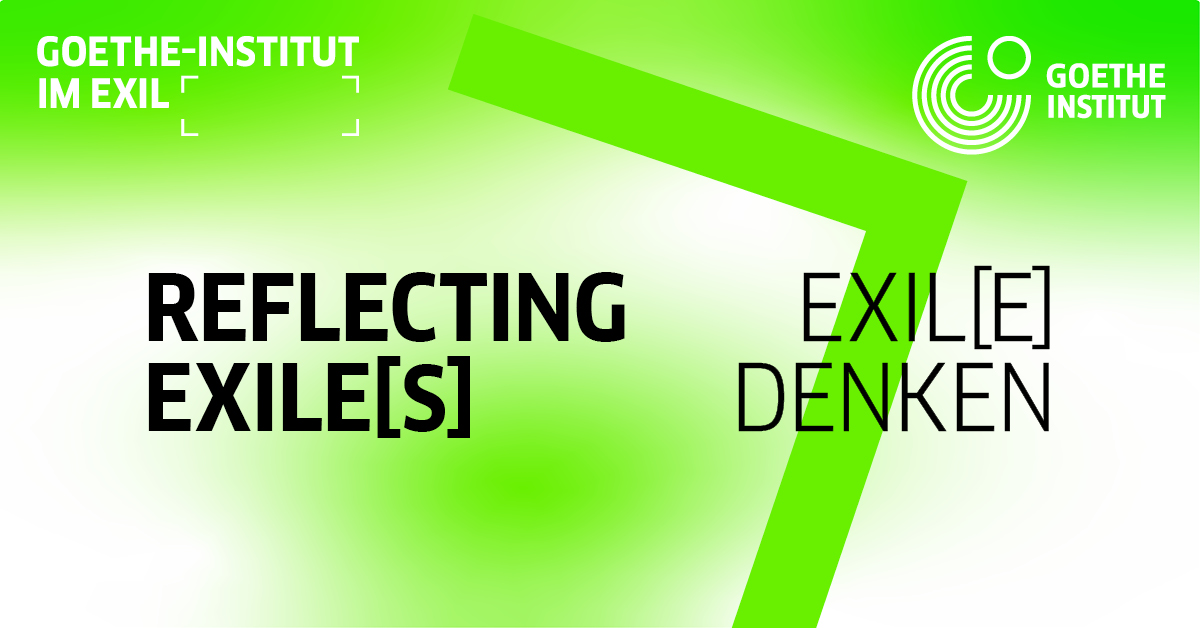REFLECTING EXILE[S]
MO 5.6, 19H ACUD Studio
Exile - Myth and Reality. What does "exile" mean in a globalising world and against the background of plurinational societies?
"Exile" is a much-used term and more timely than ever. But what does the word mean in today's world? Exiles and migrants are often perceived as a uniform group, but their different contexts are overlooked. What does "exile" mean for those affected? And how do people who grew up in exile in the second generation see themselves in contrast to those who had to flee into exile themselves? The topic of "exile" is also currently very present in the cultural sector - through exile ensembles, residencies for refugee artists or in plays on exile, migration and flight. But to what extent do people in exile themselves have their say, is their heterogeneity adequately represented? And what meaning does the term still have in an increasingly globalised world?
GUESTS:
Elisa Aseva, born in Khartoum/Sudan in 1979, lives and works in Berlin. As a representative of the latest digital literatures, she was a guest at the 12th Berlin Literature Festival 2020 before a book of hers was published. Über Stunden is her first book in which her writing appears in kaleidoscopic form. Her poetic and political reflections, fantastic and essayistic gems come together to form a snapshot of the present.
Ahmad Nasir Formuli is a puppeteer, director and actor. He studied acting at Kabul University and has been working with the Azdar Theatre Company since 2006. After a suicide attack during a theatre performance in 2014, he left Afghanistan and came to study in Germany, where he completed his Master's degree in Puppetry at the Ernst Busch Academy of Dramatic Arts in 2017. During his studies, he participated in many puppet theatre projects. Formuli creates puppets himself and gives workshops in puppets making to students, among others. As an actor, he most recently played the jester in Robert Schuster's production of "Die Stunde da wir nichts voneinander wußten" (Peter Handke) at the Stadttheater Klagenfurt.
Anis Hamdoun is a German-Syrian director, author, acting mentor and educator. As an artist traveller, he and his theatre plays travelled around Germany and Europe. He wrote and directed at many famous state and free scene theatres. As a filmmaker he was involved in many documentary and fiction films occupying the roles of dramaturge, writer, casting director and director. Anis also works as an artistic mentor, teaching at the University of Arts Berlin for five years and as an acting mentor at Die Etage Theatre School for a graduation project at the acting department, and giving Drama writing lectures at the Film Arche cinema institute Berlin.
Volha Hapeyeva, born in Minsk (Belarus), is a poet, author, translator and doctor of linguistics. She has received numerous prizes and awards for her work, most recently the Wortmeldungen Literature Prize (2022). Her poems have been translated into more than 15 languages. She is the author of 14 books in Belarusian. The poetry collection Mutantengarten (2020), the novel Camel Travel (2021), the essay Die Verteidigung der Poesie in Zeiten dauernden Exils (2022) and the poetry collection Trapezherz (2023) were published in German. Volha Hapeyeva is a scholarship holder of the DAAD Berliner Künstlerprogramm from 2022 to 2023.
Wolf Iro studied Slavic studies at Cambridge, Moscow and Oxford. He completed his doctorate on the work of Isaac Babel at the LMU Munich. From 2009-14 he was head of programme work in the Eastern Europe/Central Asia region and from 2014-2019 institute director in Israel. He is an active author and editor. Most recently he wrote the political essay Nach Israel kommen (Wagenbach).
MODERATION:
Andreas FanizadehAndreas Fanizadeh (born 1963 in St.Johann i.Pg., Austria) is head of the culture department of the taz in Berlin. Previously he worked for the newspaper Die Wochenzeitung in Zurich and the ID Verlag in Berlin. There he also co-edited the magazine "Die Beute".
In the series of talks "Reflecting Exile[s] - Thinking Exile[s]" we approach the term "exile" from a cultural perspective and ask questions about identity, artistic freedom and art-making in illiberal contexts. The series is organised by the Goethe-Institut in Exile, which promotes the free exchange of ideas.
